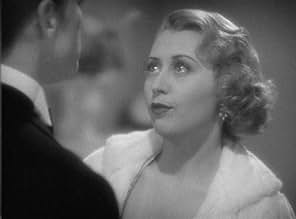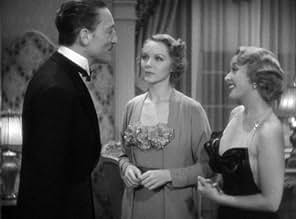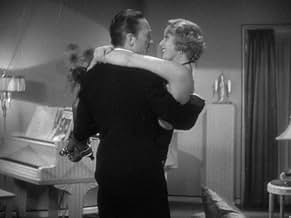Vicki Wallace teases her husband Tony until he hits her. After divorcing and marrying Vernon, her behavior leads to similar results. She returns to Tony's place, where drama unfolds with his... Read allVicki Wallace teases her husband Tony until he hits her. After divorcing and marrying Vernon, her behavior leads to similar results. She returns to Tony's place, where drama unfolds with his date Bonnie and Vernon's friends.Vicki Wallace teases her husband Tony until he hits her. After divorcing and marrying Vernon, her behavior leads to similar results. She returns to Tony's place, where drama unfolds with his date Bonnie and Vernon's friends.
Monica Bannister
- Model
- (uncredited)
Frederick Burton
- Judge
- (uncredited)
Virginia Dabney
- Duryla Model
- (uncredited)
Frank Darien
- Court Spectator
- (uncredited)
Lester Dorr
- Court Recorder
- (uncredited)
Sarah Edwards
- Mrs. Crosby's Mother
- (uncredited)
Bill Elliott
- Nightclub Patron
- (uncredited)
June Glory
- Model
- (uncredited)
Bert Moorhouse
- Court Clerk
- (uncredited)
Dennis O'Keefe
- Nightclub Patron
- (uncredited)
Featured reviews
Smarty has Warren William and Joan Blondell as a husband and wife. Joan is a
vivacious tease and a flirt and William has limits on his patience. One night when
she proves too much William belts her on the chin and Blondell files for divorce.
Johnny on the spot lawyer and neighbor Edward Everett Horton offers to be Blondell's divorce attorney and he marries her. But we're talking life with Horton and his fuss budget personality.
I think you can figure this one out. It's most dated because in this day and age no one slaps a woman without condemnation.
Still F. Hugh Herbert's script has quite a few laughs in it and Warner Brothers regulars Claire Dodd and Frank McHugh get their share also as neighbors and card playing regulars.
Funny at times, but most dated.
Johnny on the spot lawyer and neighbor Edward Everett Horton offers to be Blondell's divorce attorney and he marries her. But we're talking life with Horton and his fuss budget personality.
I think you can figure this one out. It's most dated because in this day and age no one slaps a woman without condemnation.
Still F. Hugh Herbert's script has quite a few laughs in it and Warner Brothers regulars Claire Dodd and Frank McHugh get their share also as neighbors and card playing regulars.
Funny at times, but most dated.
This pretty amusing Pre-Code Hollywood divorce farce features an excellent cast and several very funny lines. It treats divorce as simply a part of the mating game, and treats the mating game as just that; it's one cynical movie. The script is certainly nowhere as witty as the first few Thin Man movies, and is actually disturbing if you put it at all within the real context of violence against women - the way the script treats hitting your wife as an element of comedy is downright shocking.
This early screwball comedy is infuriating for two reasons: 1) the lead female character, who manages to be more irritating than the Hepburn character in BRINGING UP BABY, and 2) the way she's treated by the men in her life. At a party, Joan Blondell has a fight with her husband (Warren William) and he slaps her in the face (something to do with diced carrots). She doesn't actually seem to be all that hurt, physically or emotionally, but she nevertheless decides to get a divorce, egged on by lawyer friend Edward Everett Horton, who is himself in love with Blondell. After the divorce, Horton marries Blondell and is eventually driven to slap her as well, which sends her back to William, who not only slaps her again, but also rips her dress off of her before carting her off to the bedroom. The message, honest to God, is that some women just need to be slapped around every so often, and when they (and their husbands) realize that, happiness will reign supreme.
Despite my intense dislike of the character, Joan Blondell is very good, a little different in tone than I've ever seen her. She's not quite tough, but she's certainly not weak. She's not dumb, but she's not all that smart, either (I have no idea where the title comes from; the British title, HIT ME AGAIN, makes much more sense). I laughed out loud several times, even while I was grinding my teeth at the Blondell character and the way she was treated. The acting all around is quite good. Claire Dodd and Frank McHugh provide nice comic relief (relief, that is, from the "comic" slapping and arguing that occurs among the three leads). I don't think I've ever enjoyed a movie and been so exasperated by it at the same time.
Despite my intense dislike of the character, Joan Blondell is very good, a little different in tone than I've ever seen her. She's not quite tough, but she's certainly not weak. She's not dumb, but she's not all that smart, either (I have no idea where the title comes from; the British title, HIT ME AGAIN, makes much more sense). I laughed out loud several times, even while I was grinding my teeth at the Blondell character and the way she was treated. The acting all around is quite good. Claire Dodd and Frank McHugh provide nice comic relief (relief, that is, from the "comic" slapping and arguing that occurs among the three leads). I don't think I've ever enjoyed a movie and been so exasperated by it at the same time.
An early and not very effective entry in that 1930's movie specialty-- the screwball comedy. Some necessary elements are present— ritzy wardrobes, sophisticated dialog, colorful characters. Then too, the plot's appropriate-- a farcical marriage-go-round where no one much cares who's married to whom.
At the same time, catch the sexy Vicky (Blondell) as she endlessly rolls and unrolls her hosiery, that is, when not fitting into backless evening wear or craving a little rough man-handling. In short, it's the kind of provocative material that soon brought down the heavy hand of Hollywood censorship. (Scope out the very last scene that I expect challenged even the loose conventions of the time.)
The women are well cast, including the eye-rolling Blondell, a dryly sensible Claire Dodd, and a sweetly seductive Joan Wheeler. The problem is with the two male leads. Now, I'm a big fan of Warren William who's unequalled in ruthless, authoritative parts, e.g. Employee's Entrance (1933), Skyscraper Souls (1932), which remain true period classics. The trouble is that the role here of the discombobulated husband Tony calls for the light comedy skills of a William Powell, for example; the aristocratic William does try hard, but lacks that particular flair. Also, the naturally comedic Horton is memorable in eccentric parts, but is unfortunately miscast here as a strait-laced, jealous husband.
At the same time, director Florey doesn't manage the kind of zany pacing that could have smoothed over some of the questionable parts. Too much of his deliberate tempo comes across like the stage play the material is adapted from. As a result, the movie has its moments—mainly the super coy Blondell and a provocative parade of 30's fashions—but is otherwise a titillating disappointment.
At the same time, catch the sexy Vicky (Blondell) as she endlessly rolls and unrolls her hosiery, that is, when not fitting into backless evening wear or craving a little rough man-handling. In short, it's the kind of provocative material that soon brought down the heavy hand of Hollywood censorship. (Scope out the very last scene that I expect challenged even the loose conventions of the time.)
The women are well cast, including the eye-rolling Blondell, a dryly sensible Claire Dodd, and a sweetly seductive Joan Wheeler. The problem is with the two male leads. Now, I'm a big fan of Warren William who's unequalled in ruthless, authoritative parts, e.g. Employee's Entrance (1933), Skyscraper Souls (1932), which remain true period classics. The trouble is that the role here of the discombobulated husband Tony calls for the light comedy skills of a William Powell, for example; the aristocratic William does try hard, but lacks that particular flair. Also, the naturally comedic Horton is memorable in eccentric parts, but is unfortunately miscast here as a strait-laced, jealous husband.
At the same time, director Florey doesn't manage the kind of zany pacing that could have smoothed over some of the questionable parts. Too much of his deliberate tempo comes across like the stage play the material is adapted from. As a result, the movie has its moments—mainly the super coy Blondell and a provocative parade of 30's fashions—but is otherwise a titillating disappointment.
At one point in this movie, Joan Blondell's character confides to a friend thoughts about her husband striking her, "That's just it. If he really loved me, he'd a hit me long ago." Very much a product of its time, this pre-Hays code tale reflects a morality that seems cruel and sexist now. But the main character revels in her time; cracking double entendres and frank admissions of how she likes to be physically abused yet control the men who love her.
Joan Blondell, infamous for her proclivity for shedding her clothes at parties, seems right at home in this role. Her risqué comments and coy delivery fit neatly within the framework of her character.
You could not make this movie today. Even the thought of a woman inviting physical abuse upon herself is taboo. But not in "Smarty". This brisk, if somewhat slight, film bathes in its taboo-breaking with a kind of so what bravado. The characters are friendly, even affectionate, with each other despite the blows, both physical and emotional. The breezy repartee ignores the reality of the situations, instead playing light thanks to a humorous script and crisp performances.
Yes, "Smarty" is a look back at a time before PC was de riguer and people like Will H. Hays, for better or worse, ruled cinema. If you can get past the glossing over of physical violence, you may just be lured into the lead character's web. Joan Blondell brings it. Watching her performance in this movie, I don't know why she wasn't a bigger star.
Joan Blondell, infamous for her proclivity for shedding her clothes at parties, seems right at home in this role. Her risqué comments and coy delivery fit neatly within the framework of her character.
You could not make this movie today. Even the thought of a woman inviting physical abuse upon herself is taboo. But not in "Smarty". This brisk, if somewhat slight, film bathes in its taboo-breaking with a kind of so what bravado. The characters are friendly, even affectionate, with each other despite the blows, both physical and emotional. The breezy repartee ignores the reality of the situations, instead playing light thanks to a humorous script and crisp performances.
Yes, "Smarty" is a look back at a time before PC was de riguer and people like Will H. Hays, for better or worse, ruled cinema. If you can get past the glossing over of physical violence, you may just be lured into the lead character's web. Joan Blondell brings it. Watching her performance in this movie, I don't know why she wasn't a bigger star.
Did you know
- TriviaTony tells Vicki that he's been going to the movies quite a lot recently, and there the women are quite different: "They get pushed in the face with grapefruit and they love it." This is a reference to L'ennemi public (1931) with James Cagney, who famously shoved half a grapefruit into Mae Clarke's face. Joan Blondell also was in that film, so this apparently is an inside joke.
- GoofsAt the 4 minute mark the boom mic shadow moves on the wall by the book shelves.
- Quotes
George Lancaster: Love is the illusion that one woman differs from another.
- ConnectionsReferences L'ennemi public (1931)
- SoundtracksBridal Chorus
(1850) (uncredited)
from "Lohengrin"
aka "Here Comes the Bride"
Music by Richard Wagner
Performed by the Vitaphone Orchestra
Variation played when marriage is announced in gossip column
Details
- Runtime1 hour 5 minutes
- Color
- Sound mix
- Aspect ratio
- 1.37 : 1
Contribute to this page
Suggest an edit or add missing content





































